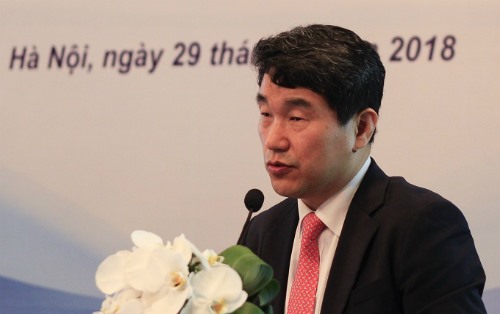 Society
Society

Việt Nam should utilise cutting-edge technology to reform education to become a fast mover, said Professor Ju Ho Lee, Republic of Korea (RoK)’s former Minister of Education, Science, and Technology.
 |
| Professor Ju Ho Lee, Republic of Korea (RoK)’s former Minister of Education, Science, and Technology speaks at a higher education strategy stakeholder consultation yesterday. — Photo vnexpress.net |
HÀ NỘI — Việt Nam should utilise cutting-edge technology to reform education to become a fast mover, said Professor Ju Ho Lee, Republic of Korea (RoK)’s former Minister of Education, Science, and Technology.
He was speaking yesterday at a higher education strategy stakeholder consultation hosted by World Bank and Việt Nam’s Ministry of Education and Training.
“In the era of the fourth industrial revolution, learning system should be changed from mass production to mass personalisation,” he said.
Artificial intelligence and bigger data enables educators to provide personalised learning for every child. They will become a game changer, he suggested from RoK’s experience.
He emphasised the importance of universities as central hubs for an innovation eco-system.
“It is high time for Việt Nam to turn to university and support research,” he added.
Việt Nam should make students enjoy learning, focus on active learning and encourage students to learn rather than asking them to memorise, he said.
The stakeholder consultation brought about experts from World Bank and countries like RoK, Colombia, UK and Malaysia to share experience and give feedback on Việt Nam’s Master Plan of Higher Education for the period of 2021-2039.
Minister of Education and Training Phùng Xuân Nhạ said Việt Nam’s higher education lacks a long-term, feasible and globally-integrated development strategy. The Master Plan of Higher Education serves as a foundation for the reform and comprehensive, sustainable, long-term development of Vietnamese higher education.
The strategy focuses on five pillars, including higher education’s management capacity, planning on a network of higher education institutions, enhancing quality of training and research and sustainable finance.
On behalf of World Bank’s Advisory Services and Analytics, educational expert Võ Kiều Dung said Việt Nam’s higher education aspirations should target four elements - access, relevance, quality and equity.
The current higher education’s enrolment ratio of Việt Nam stands much lower than other countries in the region.
Compared to 50 per cent in Malaysia, 50 per cent in Thailand and 40 per cent in China, Việt Nam should aim to increase current higher education’s gross enrolment ratio from 30 per cent to 40 to 50 per cent by 2030 as part of efforts to elevate the country’s higher education system, she said.
Enterprise surveys suggest a labour shortage, a lack of trained workers and a mismatch of skilled workers, she said, suggesting Việt Nam increase graduate employment rates. — VNS




